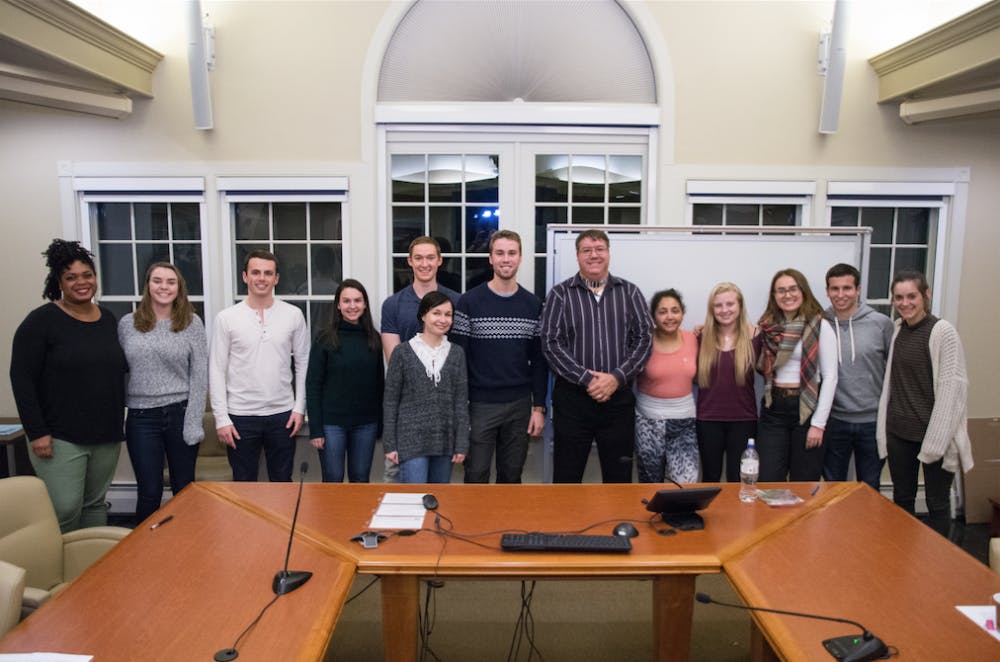Don Stevens, Chief of the Nulhegan Abenaki Tribe, delivered a lecture at the Robert A. Jones Conference Room on Monday, Nov. 27. His talk focused on “contemporary life as a person of indigenous heritage” in Vermont, and touched upon topics such as the history of the Abenaki Tribe in the region, and their relationship with the government and local communities. The Spanish class called Images of America invited Stevens as part of a final project. The talk was sponsored by the Departments of American Studies, the Spanish and Portuguese department, the Sociology and Anthropology department, and the Davis Family Library.
According to the website of the University of Vermont, Don Stevens is an “award-winning leader, businessman, writer, and lecturer.” In 2006, Stevens was selected by former Vermont governor Jim Douglas (R) to chair the Vermont Commission on Native American Affairs, where Stevens served for two terms. As the leading spokesman for the Abenaki people, Stevens fought for the acquisition of tribal land, which the tribe had not had ownership rights over for the last 200 years. According to the website Abenakitribe.org, Stevens works for the executive branch of the Abenaki government, where his responsibilities include maintaining “the day-to-day operations, security, and services of the tribe.”
Stevens began the lecture with the history of the Abenakis. He spoke of how they intermarried with the French after the French arrived in North America, and how they fought alongside them in wars. Around the late 17th century, many Abenakis began emigrating to Canada, which was under French rule at the time. Stevens talked about the Vermont eugenics laws in the 20th century that targeted the poor, the disabled, French-Canadians, and Native Americans. According to Ian Dowbiggin, an author who wrote a book on the subject, approximately 3400 Abenaki women were sterilized in the United States between 1973 and 1976, with no evidence documenting their consent to the procedures. Stevens grandmother was able to avoid sterilization.
Eventually, in 2006, the state of Vermont officially recognized the Abanaki as a People. In 2011, Vermont recognized two bands of the Abanaki: the Nulhegan Band of the Coosuk-Abenaki, and the El Nu Abenaki Tribe. The Abenaki tribe currently claims membership to both the Seven Nations of Canada, and the Wabanaki Confederacy in the United States.
Stevens spoke about the challenges facing the current Abenaki community. The biggest challenge, Stevens said, is keeping children interested in their heritage. Stevens said that if future generations do not remain invested in Abenaki culture, the tribe could run the risk of becoming extinct, since they only hold a finite amount of resources, and do not own any reservations. Because of this, many Abenakis, who are dispersed throughout New England, travel long hours to attend monthly meetings in Vermont. Another challenge Stevens mentioned is that the state of Vermont is also not required to teach about the Abenakis in schools, and no one is working full time to promote the Abenaki culture, or to obtain grants.
“The lecture was a good way for us to learn about how we could have an impact on the Native community as far as policy goes, but also just for us to learn about a culture that is close to us physically that we really don’t know about,” said Rae Aaron ’19.5, who helped to facilitate the process of inviting Stevens to campus. “Going into [the lecture], we were just hoping that the community would be able to access somebody that it normally wouldn’t be able to talk to. I think that it was really successful in that we had a wide variety of people attend for their own personal interests.”



